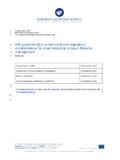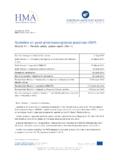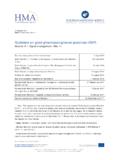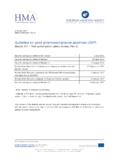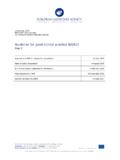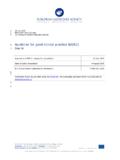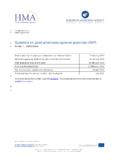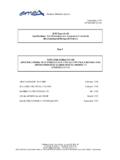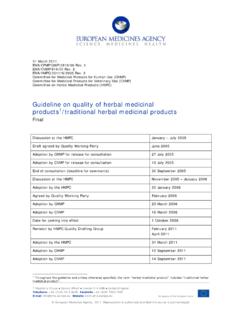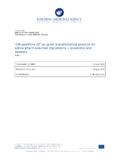Transcription of ANNEX I SUMMARY OF PRODUCT CHARACTERISTICS
1 1 ANNEX I SUMMARY OF PRODUCT CHARACTERISTICS 2 1. NAME OF THE MEDICINAL PRODUCT ABILIFY 5 mg tablets ABILIFY 10 mg tablets ABILIFY 15 mg tablets ABILIFY 30 mg tablets 2. QUALITATIVE AND QUANTITATIVE COMPOSITION ABILIFY 5 mg tablets Each tablet contains 5 mg of aripiprazole. Excipient with known effect mg lactose (as monohydrate) per tablet ABILIFY 10 mg tablets Each tablet contains 10 mg of aripiprazole. Excipient with known effect mg lactose (as monohydrate) per tablet ABILIFY 15 mg tablets Each tablet contains 15 mg of aripiprazole. Excipient with known effect mg lactose (as monohydrate) per tablet ABILIFY 30 mg tablets Each tablet contains 30 mg of aripiprazole. Excipient with known effect mg lactose (as monohydrate) per tablet For the full list of excipients, see section 3.
2 PHARMACEUTICAL FORM Tablet ABILIFY 5 mg tablets Rectangular and blue, engraved with "A-007" and "5" on one side. ABILIFY 10 mg tablets Rectangular and pink, engraved with "A-008" and "10" on one side. ABILIFY 15 mg tablets Round and yellow, engraved with "A-009" and "15" on one side. ABILIFY 30 mg tablets Round and pink, engraved with "A-011" and "30" on one side. 4. CLINICAL PARTICULARS Therapeutic indications ABILIFY is indicated for the treatment of schizophrenia in adults and in adolescents aged 15 years and older. 3 ABILIFY is indicated for the treatment of moderate to severe manic episodes in Bipolar I Disorder and for the prevention of a new manic episode in adults who experienced predominantly manic episodes and whose manic episodes responded to aripiprazole treatment (see section ).
3 ABILIFY is indicated for the treatment up to 12 weeks of moderate to severe manic episodes in Bipolar I Disorder in adolescents aged 13 years and older (see section ). Posology and method of administration Posology Adults Schizophrenia: the recommended starting dose for ABILIFY is 10 mg/day or 15 mg/day with a maintenance dose of 15 mg/day administered on a once-a-day schedule without regard to meals. ABILIFY is effective in a dose range of 10 mg/day to 30 mg/day. Enhanced efficacy at doses higher than a daily dose of 15 mg has not been demonstrated although individual patients may benefit from a higher dose. The maximum daily dose should not exceed 30 mg. Manic episodes in Bipolar I Disorder: the recommended starting dose for ABILIFY is 15 mg administered on a once-a-day schedule without regard to meals as monotherapy or combination therapy (see section ).
4 Some patients may benefit from a higher dose. The maximum daily dose should not exceed 30 mg. Recurrence prevention of manic episodes in Bipolar I Disorder: for preventing recurrence of manic episodes in patients, who have been receiving aripiprazole as monotherapy or combination therapy, continue therapy at the same dose. Adjustments of daily dosage, including dose reduction should be considered on the basis of clinical status. Paediatric population Schizophrenia in adolescents aged 15 years and older: the recommended dose for ABILIFY is 10 mg/day administered on a once-a-day schedule without regard to meals. Treatment should be initiated at 2 mg (using ABILIFY oral solution 1 mg/mL) for 2 days, titrated to 5 mg for 2 additional days to reach the recommended daily dose of 10 mg.
5 When appropriate, subsequent dose increases should be administered in 5 mg increments without exceeding the maximum daily dose of 30 mg (see section ). ABILIFY is effective in a dose range of 10 mg/day to 30 mg/day. Enhanced efficacy at doses higher than a daily dose of 10 mg has not been demonstrated although individual patients may benefit from a higher dose. ABILIFY is not recommended for use in patients with schizophrenia below 15 years of age due to insufficient data on safety and efficacy (see sections and ). Manic episodes in Bipolar I Disorder in adolescents aged 13 years and older: the recommended dose for ABILIFY is 10 mg/day administered on a once-a-day schedule without regard to meals. Treatment should be initiated at 2 mg (using ABILIFY oral solution 1 mg/mL) for 2 days, titrated to 5 mg for 2 additional days to reach the recommended daily dose of 10 mg.
6 The treatment duration should be the minimum necessary for symptom control and must not exceed 12 weeks. Enhanced efficacy at doses higher than a daily dose of 10 mg has not been demonstrated, and a daily dose of 30 mg is associated with a substantially higher incidence of significant adverse reactions including EPS related events, somnolence, fatigue and weight gain (see section ). Doses higher than 10 mg/day should therefore only be used in exceptional cases and with close clinical monitoring (see sections , and ). Younger patients are at increased risk of experiencing adverse events associated with aripiprazole. Therefore, ABILIFY is not recommended for use in patients below 13 years of age (see sections and ). Irritability associated with autistic disorder: the safety and efficacy of ABILIFY in children and adolescents aged below 18 years have not yet been established.
7 Currently available data are described 4 in section but no recommendation on a posology can be made. Tics associated with Tourette s disorder: the safety and efficacy of ABILIFY in children and adolescents 6 to 18 years of age have not yet been established. Currently available data are described in section but no recommendation on a posology can be made. Special population Hepatic impairment No dosage adjustment is required for patients with mild to moderate hepatic impairment. In patients with severe hepatic impairment, the data available are insufficient to establish recommendations . In these patients dosing should be managed cautiously. However, the maximum daily dose of 30 mg should be used with caution in patients with severe hepatic impairment (see section ).
8 Renal impairment No dosage adjustment is required in patients with renal impairment. Elderly The safety and efficacy of ABILIFY in the treatment of schizophrenia or manic episodes in Bipolar I Disorder in patients aged 65 years and older has not been established. Owing to the greater sensitivity of this population, a lower starting dose should be considered when clinical factors warrant (see section ). Gender No dosage adjustment is required for female patients as compared to male patients (see section ). Smoking status According to the metabolic pathway of aripiprazole no dosage adjustment is required for smokers (see section ). Dose adjustments due to interactions When concomitant administration of strong CYP3A4 or CYP2D6 inhibitors with aripiprazole occurs, the aripiprazole dose should be reduced.
9 When the CYP3A4 or CYP2D6 inhibitor is withdrawn from the combination therapy, aripiprazole dose should then be increased (see section ). When concomitant administration of strong CYP3A4 inducers with aripiprazole occurs, the aripiprazole dose should be increased. When the CYP3A4 inducer is withdrawn from the combination therapy, the aripiprazole dose should then be reduced to the recommended dose (see section ). Method of administration ABILIFY is for oral use. Orodispersible tablets or oral solution may be used as an alternative to ABILIFY tablets for patients who have difficulty swallowing ABILIFY tablets (see section ). Contraindications Hypersensitivity to the active substance or to any of the excipients listed in section Special warnings and precautions for use During antipsychotic treatment, improvement in the patient's clinical condition may take several days to some weeks.
10 Patients should be closely monitored throughout this period. Suicidality The occurrence of suicidal behaviour is inherent in psychotic illnesses and mood disorders and in 5 some cases has been reported early after initiation or switch of antipsychotic treatment, including treatment with aripiprazole (see section ). Close supervision of high-risk patients should accompany antipsychotic treatment. Cardiovascular disorders Aripiprazole should be used with caution in patients with known cardiovascular disease (history of myocardial infarction or ischaemic heart disease, heart failure, or conduction abnormalities), cerebrovascular disease, conditions which would predispose patients to hypotension (dehydration, hypovolemia, and treatment with antihypertensive medicinal products) or hypertension, including accelerated or malignant.
